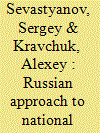| Srl | Item |
| 1 |
ID:
152344


|
|
|
|
|
| Summary/Abstract |
During the last 5 years, Russia and Japan have been able to widen and deepen bilateral ties in many spheres, including politics, economics, and culture. At the same time, the further qualitative improvement of bilateral relations is hampered by strong influence of an enduring negative historic memory of Japanese society toward Russia mostly due to the so-called Northern Territories syndrome. The formation of Russia’s image in Japan is also strongly influenced by a number of time-limited factors, such as the state leader’s popularity, single-moment events, empiric experience, and others (Streltsov 43). In this paper, the author traces the recent history of the territorial dispute between two countries and then attempts to evaluate the influence exerted by four time-limited factors: the triple disaster in Japan (as an example of the implications of natural disasters), the two leaders’ political aspirations, mutual trust, and popularity at home (as related to the personal features of President Putin and Prime Minister Abe), on the two countries’ approach toward signing a peace treaty and solving the territorial dispute. According to the author’s hypothesis, the strategic vision of Putin and Abe and their trustworthy relationship are playing the key role in improving ties between the two countries. Moreover, due to its importance for these ties, this paper considers the geopolitical environment of the Russo–Japan relations and the current state and perspective for bilateral energy cooperation. Finally, the author turns to an evaluation of whether a long-overdue compromise on the territorial dispute could be reached anytime soon.
|
|
|
|
|
|
|
|
|
|
|
|
|
|
|
|
| 2 |
ID:
082387


|
|
|
|
|
| Publication |
2008.
|
| Summary/Abstract |
The article examines Russia's New Energy Policy (NEP) and its impact on Northeast Asian security and the development of the Russian Far East. In contrast to analyses highlighting competition between China and Japan for Russian resources, to the contrary it is argued here that greater cooperation among consumer states in Northeast Asia would be beneficial for Russia. Although the NEP has resulted in changes in the composition of foreign investors in Russian energy projects, the author suggests that Moscow is interested in multinational cooperation in the energy sector because it would help diversify the regional energy market and contribute to the development of the Russian Far East and eastern Siberia.
|
|
|
|
|
|
|
|
|
|
|
|
|
|
|
|
| 3 |
ID:
151258


|
|
|
|
|
| Summary/Abstract |
This article is devoted to the research of military and economic aspects of national security of the Russian Federation in the Arctic. The authors consider national riches as the country`s main security object in the region. This work describes basic measures undertaken by Moscow over recent years to improve Russia`s defense capabilities as well as main components of its economic policy in the Arctic. It also analyses positive and negative factors that could influence implementation of Russia`s energy and infrastructure projects in the Arctic. Finally, in the context of the so-called “Russian pivot to the East” the authors assess prospects of Russian cooperation with Asia-Pacific nations (especially China, South Korea and Japan) in the Arctic.
|
|
|
|
|
|
|
|
|
|
|
|
|
|
|
|